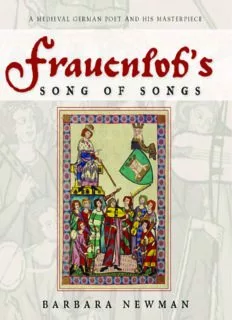
Frauenlob's Song of Songs: A Medieval German Poet and His Masterpiece PDF
Preview Frauenlob's Song of Songs: A Medieval German Poet and His Masterpiece
00i-xxii.Newman.FM.qxd 10/18/06 7:13 AM Page i frauenlob’s song of songs 00i-xxii.Newman.FM.qxd 10/18/06 7:13 AM Page ii 00i-xxii.Newman.FM.qxd 10/18/06 7:13 AM Page iii A MEDIEVAL GERMAN POET AND HIS MASTERPIECE Frauenlob’s s o n g o f s o n g s R B A R B A R A N E W M A N with thecritical text of karl stackmann and a musical performance on cd by theensemble sequentia directed bybarbara thornton and benjamin bagby The Pennsylvania State University Press University Park, Pennsylvania 00i-xxii.Newman.FM.qxd 10/18/06 7:13 AM Page iv Disclaimer: Some images in the original version of this book are not available for inclusion in the eBook. Library of Congress Cataloging-in-Publication Data Frauenlob, d.1318. [Marienleich. English& German (Middle High German)] Frauenlob’s Song of songs : a medieval German poet and his masterpiece/ Barbara Newman ; with the critical text of Karl Stackmann ; and a musical performance on CD by the Ensemble Sequentia directed by Barbara Thornton and Benjamin Bagby. p. cm. Includes bibliographical references and index. ISBN 0-271-02925-0 (pbk. : alk. paper) 1. Frauenlob, d.1318. Marienleich. 2. Frauenlob, d.1318—Criticism and interpretation. 3. German poetry—Middle High German, 1050–1500— History and criticism. I.Newman, Barbara. II.Stackmann, Karl. III.Title. PT1519.F7A66 2006 831'.22—dc22 2006016920 Copyright ©2006 The Pennsylvania State University All rights reserved Printed in the United States of America Published by The Pennsylvania State University Press, University Park, PA 16802-1003 The Pennsylvania State University Press is a member of the Association of American University Presses. It is the policy of The Pennsylvania State University Press to use acid-free paper. This book is printed on paper containing 50% post-consumer waste, and meets the minimum requirements of American National Standard for Information Sciences—Permanence of Paper for Printed Library Material, ANSI Z39.48–1992. 00i-xxii.Newman.FM.qxd 10/18/06 7:13 AM Page v contents R List of Illustrations vii Preface ix About the Text, the Translation, and the Recording xv Marienleich / Frauenlob’s Song of Songs: Text and Translation 1 1 The Performer, His Public, and His Peers 43 2 Frauenlob’s Canon 63 3 The Marienleich in Context 91 4 The Marienleich as a Work of Art 123 5 Reception and Influence 139 Commentary on the Marienleich 175 Glossary of Technical Terms 219 Abbreviations 221 Bibliography 223 Index of MarienleichCitations 233 Index of Biblical Citations 235 General Index 237 00i-xxii.Newman.FM.qxd 10/18/06 7:13 AM Page vi 00i-xxii.Newman.FM.qxd 10/18/06 7:13 AM Page vii list of illustrations R 1.Frauenlob directs his “singing school” (Manesse Codex, fol.399r). Photo: Heidelberg, Universitätsbibliothek 45 2.Frauenlob debates with Regenbogen (Manesse Codex, fol.381r). Photo: Heidelberg, Universitätsbibliothek 47 3.Initial “E” with drawing of Virgin and seer (Manesse Codex, fol.399v). Photo: Heidelberg, Universitätsbibliothek 142 4.Music from the Marienleich, strophe 14 (Vienna leich manuscript). Photo: A.N.L., picture archives, Vienna 144 5.“Marian quaternity,” retable ascribed to Heinrich Helmschrott (Church of St.Nicholas, Eggenfelden, Bavaria, ca.1480). Photo: Richard Kieckhefer 166 6.Double nature of Mary: The Madonna and the Eternal Virgin (Matthias Grünewald, Isen- heim Altarpiece, Colmar; ca.1515). Erich Lessing/Art Resource, NY 168 7.Frauenlob’s tombstone (Mainz Cathedral cloister, 1783). Photo: Richard Kieckhefer 171 00i-xxii.Newman.FM.qxd 10/18/06 7:13 AM Page viii in memoriam Barbara Thornton 00i-xxii.Newman.FM.qxd 10/18/06 7:13 AM Page ix preface R The poet Frauenlob, whose stage name means either “praise of ladies” or “praise of Our Lady,” was born between 1250 and 1260 in Meissen, Saxony, near the Bohemian border, and died in Mainz on November 29, 1318.1 Manuscripts refer to him as Heinrich von Meissen, after his birthplace, or, more often, Meister Heinrich Vrouwenlop, after his art. From the mid-1270s until his death, Frauenlob pursued the life of a traveling minstrel, composing and performing topical poems, religious verse, and the occasional love song at the courts of noble patrons rang- ing from the kings of Bohemia and Denmark to the archbishops of Bremen and Mainz. Admired equally for his gifts as musician and poet, he became the acknowledged master of the geblümter Stil, or “flowery style.” By the time of his death, he was a highly acclaimed and much imitated though controversial figure whose talents and connections merited the privilege of burial in Mainz Cathedral. The poet’s star remained in the ascendant for three centuries afterward: the meistersingers regarded Frauenlob as the greatest of the twelve old masters they revered as pre- cursors, even claiming that he had founded the first singing school in Mainz. In their own schools, aspiring poets continued to compose new lyrics for his melodies and rhyme schemes up to the eighteenth century. Thereafter, Frauenlob’s fame suffered a swift and near-total eclipse. Although a few of the Romantics appreciated him, most critics had little use for his hermetic and immensely learned poems, which in their view savored too much of the intellect and too little of the heart. Protes- tants tended to find his fervent Marian piety blasphemous, and rationalist scholars even ques- tioned his sanity. Despite the publication of Frauenlob’s collected works by Ludwig Ettmüller in 1843,2the poet attracted virtually no further attention until 1913, when Ludwig Pfannmüller 1. For a general introduction, see Karl Stackmann, “Frauen- 2. Frauenlob (Heinrich von Meissen), Heinrichs von Meissen lob,” Die deutsche Literatur des Mittelalters: Verfasserlexikon,2nd ed. des Frauenlobes Leiche, Sprüche, Streitgedichte und Lieder,ed. Lud- (Berlin: Walter de Gruyter, 1980), 2:865–77. wig Ettmüller (Leipzig: G.Basse, 1843).
Description: